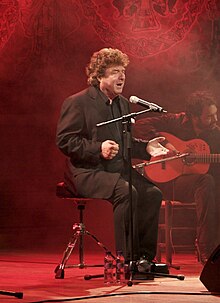Enrique Morente | |
|---|---|
 | |
| Background information | |
| Birth name | Enrique Morente Cotelo |
| Born | 25 December 1942 Granada, Spain |
| Died | 13 December 2010 (aged 67) Madrid, Spain |
| Genres | New flamenco |
| Occupation(s) | Singer, songwriter |
| Years active | 1960s–2010 |
| Website | enriquemorente |
Enrique Morente Cotelo (25 December 1942 – 13 December 2010), known as Enrique Morente, was a Spanish flamenco singer and a celebrated figure within the world of contemporary flamenco. After his orthodox beginnings, he plunged into experimentalism, writing new melodies for cante (flamenco singing) and jamming with musicians of all styles, without renouncing his roots in traditional flamenco singing, which he kept on cultivating despite criticism.[1][2]
"It hasn't been easy. First came the accusations of corruption of the music, of treachery in his struggle to disfigure what was already perfectly coded. When some albums and some categorical evidence of his knowledge of the classical approach laid these malicious comments bare, then came the most twisted condemnations. That the pace of the compás waned (just get a metronome and see for yourself), that he didn't really make you feel (are there really many true aficionados whose hair doesn't stand on end listening to his caña 'Eso no lo manda la ley', 'La aurora de Nueva York' or 'Generalife', to name three markedly different examples) and that kind of thing."
[3][page needed] he was perhaps the most influential contemporary flamenco singer, who not only innovated, but it could also be said that he created tradition: some of his cantes have been performed by other singers such as Camarón de la Isla, Mayte Martín, Carmen Linares, Miguel Poveda, Segundo Falcón and Arcángel. He also is the father of flamenco singer Estrella Morente. The posthumously published volume of Leonard Cohen's poems, The Flame, includes "Homage to Morente." (pp. 30–31)[4]
- ^ Enrique Morente in macande.com Archived 3 September 2006 at the Wayback Machine
- ^ D'Averc, Alexandre. "A desire and a quest for everything. Enrique Morente, cantaor. Interview". flamenco-world.com. Archived from the original on 11 May 2007. Retrieved 2 December 2006.
- ^ Álvarez Caballero, Ángel: "Enrique Morente", La discografía ideal del flamenco, Planeta, Barcelona, 1995 ISBN 84-08-01602-4
- ^ Leonard Cohen, The Flame, pp.30–31, Farrar, Straus and Giroux, 2018 ISBN 978-0-374-15606-0